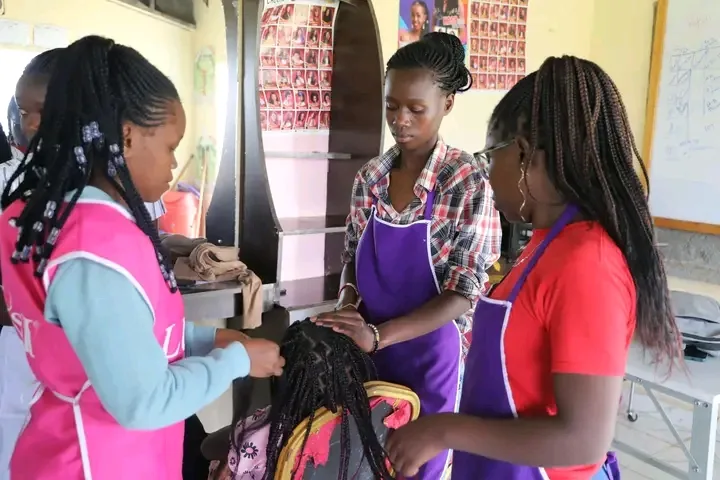Youth Encouraged to Explore Technical Education: TVET Admission Requirements.
The Kajiado County Executive Committee Member (CECM) for Education, Vocational Training, Youth, and Sports, Janet Sereu, has called on young people who did not meet the minimum university entry requirements to consider pursuing technical courses in vocational institutions.
Sereu emphasized the value of technical education, urging the youth to view it as a viable alternative to university education. She pointed out that blue-collar professions, often overlooked, are just as vital as white-collar jobs in building sustainable careers.
Sereu highlighted the growing significance of innovation-driven economies, particularly in developed countries such as Turkey, where vocational skills underpin economic growth.
She stated that technical education equips individuals with the ability to innovate and become self-employed, offering numerous opportunities to generate income.
She also encouraged parents to support their children who may not have excelled in the Kenya Certificate of Secondary Education (KCSE) examinations.
According to Sereu, skills in areas like tailoring, mechanical engineering, plumbing, and hairdressing can lead to lucrative careers and provide alternatives to idleness in rural areas.
County Initiatives and Partnerships
The Kajiado County Government has collaborated with the Kenya Chamber of Commerce to empower youth through training in setting up Small and Medium Enterprises (SMEs).
The partnership also includes providing startup capital to help young entrepreneurs establish alternative income sources.
TVET Admission Requirements
The minimum requirements for Technical and Vocational Education and Training (TVET) programs across Kenya are as follows:
| Course Level | Minimum KCSE Grade |
|---|---|
| Artisan (Level 4) | E |
| Craft (Level 5) | D |
| Diploma (Level 6) | C- |
Applications for the January 2025 intake are ongoing in all TVET institutions nationwide, with the deadline set for January 17, 2025.
KCSE 2024 Performance Statistics
The Ministry of Education released data on the 2024 KCSE performance, revealing a notable improvement in academic outcomes compared to 2023:
- Overall Grade A: 1,693 candidates (0.18%) in 2024, up from 1,216 (0.14%) in 2023.
- University Entry (Grade C+ and Above): 246,391 candidates (25.53%) in 2024, an increase from 201,133 (22.27%) in 2023.
- TVET Diploma Eligibility (Grade C- and Above): 476,889 candidates (49.41%) in 2024, compared to 401,216 (44.42%) in 2023.
- Pass Grade (Grade D+ and Above): 605,774 candidates (62.76%) in 2024, rising from 526,222 (58.27%) in 2023.
Read Also: Midnight Blaze Ravages University of Nairobi: Aftermath [Photos]
The government has reassured the 716,121 students who missed university entry points after the 2024 Kenya Certificate of Secondary Education (KCSE) examinations that the Technical, Vocational Education and Training (TVET) sector offers a robust alternative for their career aspirations.
Officials stated that TVET institutions are fully prepared to equip them with practical, industry-relevant skills.

Government Encourages 716,121 Students to Explore TVET Pathways
Dr. Esther Thaara Muoria, Principal Secretary for the State Department for TVET, highlighted that TVET provides an excellent platform for students to gain hands-on, market-driven skills.
Speaking during a visit to Kabete National Polytechnic, she encouraged the students to enroll in TVET programs, emphasizing their alignment with local and global job market demands.
Of the 962,512 candidates who sat for the 2024 KCSE exams, only 246,391 met university entry requirements. This left 716,121 students with opportunities to pursue technical and vocational training as an alternative pathway to career development.
| KCSE 2024 Results Summary | Number of Candidates |
|---|---|
| Total Candidates | 962,512 |
| Qualified for University | 246,391 |
| Eligible for TVET Programs | 716,121 |
Dr. Muoria explained that the TVET sector has made significant advancements, particularly in adopting the Competency-Based Education and Training (CBET) model. This approach integrates dual training to ensure trainees gain both theoretical and practical expertise.
She noted that the curriculum is continually updated to meet evolving industry needs, equipping learners to compete favorably in local and international labor markets.
The Principal Secretary reiterated that the TVET sector is committed to providing accessible, affordable, and high-quality training that aligns with both national and international standards.
Addressing parents and guardians of the students, Dr. Muoria assured them that measures are in place to ensure seamless admission and training in TVET institutions. She emphasized the sector’s readiness to accommodate the youths and provide a supportive environment for their educational journey.
Breaking Stereotypes Around TVET
Dr. Muoria urged the public to discard the misconception that TVET is an inferior option compared to university education. She stressed that TVET is a viable and sometimes superior alternative, offering practical skills essential for getting tasks done.
She elaborated, saying that young people must recognize that everyone is unique and that TVET provides a pathway tailored to developing practical competencies. She added that the sector’s focus on skill development makes it a critical driver of economic growth.
Dr. Muoria pointed out that government programs like the Affordable Housing Programme (AHP) and County Aggregation and Industrial Parks demonstrate the readiness of TVET institutions to train youths in diverse disciplines. These initiatives aim to address both current and future labor market demands.
The government remains committed to promoting the TVET sector as a cornerstone for the country’s socio-economic transformation.
A Call to Action
Sereu reiterated the importance of technical education in addressing unemployment and equipping youth with practical skills.
She urged the youth to seize the opportunities available in TVET institutions, stressing that technical expertise is a pathway to innovation and economic empowerment.
By leveraging the resources provided through county partnerships and government initiatives, the youth can actively participate in building sustainable livelihoods and contribute to the nation’s economic growth.
Youth Encouraged to Explore Technical Education: TVET Admission Requirements.


Discussion about this post